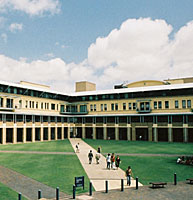|
||||||||||||||||||||||||||||||||||||||||||||||||||||||||||||||||||||||||||||||||||||||||||||||||||||||||||||||
| Sociology and Anthropology | ||||||||||||||||||||||||||||||||||||||||||||||||||||||||||||||||||||||||||||||||||||||||||||||||||||||||||||||

Sociology and Anthropology is an area of study for students with a special interest in human relationships and the multiplicity of interactive cooperation, conflict and communication which constitutes any society.
Both Sociology and Anthropology explore the social and cultural realities of human life. The earlier distinction between these two disciplines, the former focusing on Western societies and the latter on non-Western societies, has tended to disappear in a globalising world. Societies and cultures have become so linked, through migration, communications, mass consumerism and capital flows, that the borders of social and cultural life have been radically changed. At UNSW, the School of Sociol Sciences and International Studies offers a diverse program where students may choose courses in sociology, social anthropology, cultural theory, cultural studies, sociological approaches to communication and the public media, political sociology and policy-related studies. The study of Sociology and Anthropology is a good preparation for working in any field where observation, critical analysis and evaluation, and the presentation of written and spoken communication are important. After graduation, your work could be in research, policy, planning, management, teaching or administration. You could be employed in a large government or a non-government organisation, in media and communications, in a public or private research unit, in a large corporation or a small business. Studying Sociology and Anthropology at UNSW The School of Social Sciences and International Studies (sociology.arts.unsw.edu.au) offers a major sequence in Sociology within the Bachelor of Arts program and a number of other programs based in the Faculty of Arts and Social Sciences.
Sociology can be studied in the following Programs
Sociology and Anthropology can be studied in the following Programs
|
||||||||||||||||||||||||||||||||||||||||||||||||||||||||||||||||||||||||||||||||||||||||||||||||||||||||||||||



